- Home
- Paulo Coelho
Hippie
Hippie Read online
ALSO BY PAULO COELHO
The Alchemist
The Pilgrimage
The Valkyries
By the River Piedra I Sat Down and Wept
The Fifth Mountain
Veronika Decides to Die
Warrior of the Light: A Manual
Eleven Minutes
The Zahir
The Devil and Miss Prym
The Witch of Portobello
Brida
The Winner Stands Alone
Aleph
Manuscript Found in Accra
Adultery
The Spy
THIS IS A BORZOI BOOK
PUBLISHED BY ALFRED A. KNOPF
Translation Copyright © 2018 by Eric M. B. Becker
All rights reserved. Published in the United States by Alfred A. Knopf, a division of Penguin Random House LLC, New York, and distributed in Canada by Random House of Canada, a division of Penguin Random House Canada Limited, Toronto. Originally published in Brazil as Hippie by Editora Paralela, a division of Editora Schwarcz S.A., São Paulo, in 2018. Copyright © 2018 by Paulo Coelho. This edition published by arrangement of Sant Jordi Asociados Agencia Literaria SLU, Barcelona, Spain.
www.aaknopf.com
Knopf, Borzoi Books, and the colophon are registered trademarks of Penguin Random House LLC.
Library of Congress Cataloging in Publication Data
Names: Coelho, Paulo, author. | Becker, Eric M. B., translator.
Title: Hippie / Paulo Coelho ; translated by Eric M. B. Becker.
Other titles: Hippie. English
Description: First edition. | New York : Alfred A. Knopf, 2018.
Identifiers: LCCN 2018029632 (print) | LCCN 2018035241 (ebook) | ISBN 9780525655619 (hardcover : alk. paper) | ISBN 9780525655626 (ebook) | ISBN 9781524711474 (open market)
Subjects: LCSH: Coelho, Paulo—Fiction. | GSAFD: Autobiographical fiction.
Classification: LCC PQ9698.13.O3546 (ebook) | LCC PQ9698.13.O3546 H56 2018 (print) | DDC 869.3/42—dc23
LC record available at https://lccn.loc.gov/2018029632
Ebook ISBN 9780525655626
This is a work of fiction. Names, characters, places, and incidents either are the product of the author’s imagination or are used fictitiously. Any resemblance to actual persons, living or dead, events, or locales is entirely coincidental.
Cover design by Tyler Comrie
Map © Christina Oiticical
v5.3_r1.2
ep
Contents
Cover
Also by Paulo Coelho
Title Page
Copyright
Epigraphs
Dedication
Magic Bus Route
Author's Note
Chapter 1
Chapter 2
Chapter 3
Chapter 4
Chapter 5
Chapter 6
Chapter 7
Chapter 8
Chapter 9
Chapter 10
Chapter 11
Chapter 12
Chapter 13
Chapter 14
Chapter 15
Chapter 16
Chapter 17
Chapter 18
Chapter 19
Chapter 20
Chapter 21
Chapter 22
Chapter 23
Chapter 24
Chapter 25
Chapter 26
Chapter 27
Chapter 28
Chapter 29
Chapter 30
Chapter 31
Chapter 32
Chapter 33
Chapter 34
Chapter 35
Chapter 36
Chapter 37
Chapter 38
Chapter 39
Chapter 40
Chapter 41
Chapter 42
Chapter 43
Epilogue
Author’s Note and Acknowledgments
A Note About the Author
A Note About the Translator
O Mary!
conceived without sin,
pray for us who turn to you!
Amen.
He was told, “Your mother and your brothers are standing outside and they wish to see you.”
He said to them in reply, “My mother and my brothers are those who hear the word of God and act on it.”
—LUKE 8:20–21
I thought that my voyage had come to its end
at the last limit of my power,
—that the path before me was closed,
that provisions were exhausted
and the time come to take shelter in a silent obscurity.
But I find that thy will knows no end in me.
And when old words die out on the tongue,
new melodies break forth from the heart;
and where the old tracks are lost,
new country is revealed with its wonders.
—RABINDRANATH TAGORE
For Kabir, Rumi, Tagore, Paulo de Tarso, Hafez,
Who have been with me ever since I first discovered them,
Who have written part of the story of my life,
Which I tell in the book that follows—often using their words.
The stories that follow come from my personal experiences. I’ve altered the order, names, and details of the people here, I was forced to condense some scenes, but everything that follows truly happened to me. I’ve used the third person because this allowed me to give characters unique voices with which to describe their lives.
In September 1970, two sites squared off for the title of the center of the world: Piccadilly Circus, in London, and Dam Square, in Amsterdam. But not everyone knew this: if you asked most people, they’d have told you: “The White House, in the US, and the Kremlin in the USSR.” These people tended to get their information from newspapers, television, radio, media that were already entirely outdated and that would never regain the relevance they had when first invented.
In September 1970, airplane tickets were outrageously expensive, which meant only the rich could travel. OK, that wasn’t entirely true for an enormous number of young people whom these outdated media outlets could see only for their outward appearance: they wore their hair long, dressed in bright-colored clothing, and never took a bath (which was a lie, but these young kids didn’t read the newspaper, and the older generation believed any news item that served to denigrate those they considered “a danger to society and common decency”). They were a danger to an entire generation of diligent young boys and girls trying to succeed in life, with their horrible example of lewdness and “free love,” as their detractors liked to say with disdain. Well, this ever-growing number of kids had a system for spreading news that no one, absolutely no one, ever managed to detect.
The “Invisible Post” couldn’t be bothered to discuss the latest Volkswagen or the new powdered soaps that had just been launched around the globe. It limited its news to the next great trail awaiting exploration by those insolent, dirty kids practicing “free love” and wearing clothes no one with any taste would ever put on. The girls with their braided hair covered in flowers, their long dresses, bright-colored shirts and no bras, necklaces of all shapes and sizes; the boys with their
hair and beards that hadn’t been cut for months. They wore faded jeans with tears from overuse because jeans were expensive everywhere in the world—except for the US, where they’d emerged from the ghetto of factory workers and were worn at all the major open-air shows in and around San Francisco.
The “Invisible Post” existed because people were always going to these concerts, swapping ideas about where they ought to meet next, how they could explore the world without jumping aboard one of those tourist buses where a guide described the sights while the younger people grew bored and the old people dozed. And so, thanks to word of mouth, everyone knew where the next concert was to take place or where to find the next great trail to be explored. No one had any financial restrictions because, in this community, everyone’s favorite author wasn’t Plato or Aristotle or comics from some artist who’d attained celebrity status; the big book, which almost no one who traveled to the Old Continent did so without, went by the name Europe on 5 Dollars a Day. With this book, everyone could find out where to stay, what to see, where to eat, where to meet, and where to catch live music while hardly spending a thing.
Frommer’s only error at the time was having limited his guide to Europe. Were there not perhaps other interesting places to see? Weren’t there those who would rather go to India than to Paris? Frommer would address this failing a few years later, but until such time the “Invisible Post” took it upon itself to promote a South American itinerary ending at the once-“lost” city of Machu Picchu, with the warning not to mention anything to those who were outside of the hippie culture, lest the place be invaded by wild animals with cameras and extensive explanations (quickly forgotten) about how a band of Indians had created a city so well concealed it could be discovered only from above—something they considered impossible, since men did not fly.
Let’s be fair: there was a second enormous bestseller, though not as popular as Frommer’s book, which appealed more to those who had already flirted with socialism, Marxism, and anarchy; each of these phases always ended in deep disillusionment with the system invented by those who professed that “it was inevitable that the workers of the world would seize power.” Or that “religion is the opium of the masses,” which only proved that whoever uttered such a stupid statement understood little about the masses and even less about opium: among the things these poorly dressed kids believed in were God, gods, goddesses, angels, that sort of thing. The only problem is that the book, The Morning of the Magicians, written by the Frenchman Louis Pauwels and the Russian Jacques Bergier—mathematician, ex-spy, tireless student of the occult—said exactly the opposite of political manuals: the world is made up of the most interesting things. There were alchemists, wizards, Cathars, Templars, and other words that meant it never had much success in the bookstores. A single copy was read by—at a minimum—ten people, given its exorbitant price. Anyway, Machu Picchu was in this book, and everyone wanted to go there, to Peru, and that’s where you could find young people from all over the world (well, all over the world is a bit of an exaggeration, because those who lived in the Eastern Bloc didn’t have the easiest time leaving their respective countries).
* * *
—
Anyway, getting back to our story: young people from all corners of the globe who had managed at least one priceless good known as a “passport” met up on the so-called hippie trails. No one knew exactly what the word “hippie” meant, and it didn’t much matter. Perhaps it meant “a large tribe without a leader” or “delinquents who don’t steal,” or all the other descriptions we already covered earlier in this chapter.
Passports, these tiny little books issued by governments and placed along with cash (a lot or little, it doesn’t really matter) inside a belt worn around the waist, served two purposes. The first, as we all know, was for crossing borders—as long as the border guards didn’t get caught up in the news reports and decide to send someone back because they weren’t accustomed to those clothes and that hair, or those flowers and those necklaces and those beads and those smiles belonging to people who seemed to live in a constant state of ecstasy—a state normally, though often unjustly, attributed to diabolical drugs that, according to the press, these young people consumed in ever greater quantities.
A passport’s second purpose was to get its owner out of extreme situations where they’d run out of money and had nowhere to appeal for help. In such cases, the “Invisible Post” always provided much-needed information regarding locations where a passport might be sold. The price varied according to the country: a passport from Sweden, where everyone was blond, tall, and blue-eyed, wasn’t worth much, since it could be resold only to those who were blond, tall, and blue-eyed, and so these were never the most sought-after. But a Brazilian passport was worth a fortune on the black market—the country was home not only to the blond, tall, and blue-eyed, but also to those who were tall and short, black people with dark eyes, Asians with narrow eyes, others of mixed race, Indians, Arabs, Jews; in other words, an enormous cultural melting pot that made a Brazilian passport one of the most coveted on the planet.
Once he’d sold this passport, the original owner would go to his country’s consulate and, feigning horror and distress, explain that he’d been mugged and everything taken—he was completely out of money and had no passport. The consulates of wealthier countries would furnish a new passport and a free flight back to a traveler’s country of origin, an offer immediately declined under the allegation that “somebody owes me a hefty sum, I need to get what’s mine before I go.” The poorer countries, often governed by harsh regimes in the hands of generals, would conduct a veritable interrogation to determine whether the applicant wasn’t on a list of “terrorists” wanted for subversion. Once they’d verified that the young woman (or man) had a clean record, these countries were bound, against their will, to issue the new document. And they never offered a return flight, because they had no interest in having such derelicts influence generations that had been raised to respect God, family, and property.
* * *
—
Returning to the trails: after Machu Picchu, the next hot spot was Tiahuanaco, in Bolivia. Then Lhasa, in Tibet, where it was difficult to enter because, according to the “Invisible Post,” there was a war between monks and Chinese soldiers. Of course it was difficult to imagine such a war, but everyone took it seriously and wasn’t about to risk an endless trip to later end up a prisoner to the monks or the soldiers. The last of the era’s great philosophers, who had just split up in April of that year, had a short time before proclaimed that the greatest wisdom on the planet was to be found in India. That was enough to send all the world’s young people to the country in search of wisdom, knowledge, gurus, vows of poverty, enlightenment, and communion with My Sweet Lord.
The “Invisible Post,” however, warned that Maharishi Mahesh Yogi, famed guru to the Beatles, had tried to engage in sexual relations with Mia Farrow. The actress had always been unhappy in love through the years. She had traveled to India at the invitation of the Beatles, possibly in the hope of finding a cure for other traumas related to her sexuality, which seemed to hound her like bad karma.
But everything suggests that Farrow’s bad karma had accompanied her, John, Paul, George, and Ringo on their trip. According to Farrow, she was meditating in the great seer’s cave when he grabbed her and tried to force her into sexual relations. By this point in the trip, Ringo had already returned to England because his wife hated Indian food and Paul had also decided to abandon the retreat, convinced that it wasn’t doing anything for him.
Only George and John remained in the Maharishi’s temple when Mia came looking for them, in tears, and told them what had happened. The two immediately packed their bags, and when the Enlightened One came to ask what was going on, Lennon gave him a bruising response:
“You’re the fucking Enlightened One, are you not? You ought to be able to figure it out.”
* * *
—
Now, in September 1970, women ruled the world—or, more precisely, young hippie women ruled the world. Wherever they went, the men did so knowing these women weren’t about to be seduced by the latest trends—the women knew much more about the subject than the men did. And so the men decided to accept once and for all that they needed these women; they constantly wore an expression of yearning, as though begging, “Please protect me, I’m all alone and I can’t find anyone, I think the world’s forgotten me and love has forsaken me forever.” The women had their pick of men and never gave a thought to marriage, only to having a good time enjoying wild, intense sex. When it came to the important things, and even the most superficial and irrelevant, they had the last word. However, when the “Invisible Post” brought news of Mia Farrow’s sexual assault and Lennon’s reaction, these women immediately decided to change their itineraries.
A new hippie trail was created, from Amsterdam (Holland) to Kathmandu (Nepal), on a bus that charged a fare of approximately a hundred dollars and traveled through countries that must have been pretty interesting: Turkey, Lebanon, Iraq, Iran, Afghanistan, Pakistan, and part of India (a great distance from the Maharishi’s temple, it’s worth noting). The trip lasted three weeks and an insane number of miles.

 The Alchemist
The Alchemist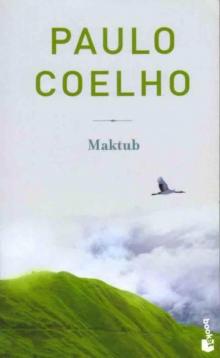 Maktub
Maktub Like the Flowing River
Like the Flowing River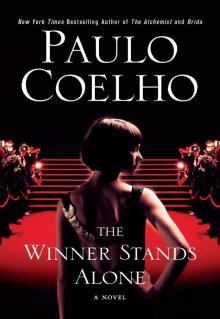 The Winner Stands Alone
The Winner Stands Alone The Spy
The Spy By the River Piedra I Sat Down and Wept: A Novel of Forgiveness
By the River Piedra I Sat Down and Wept: A Novel of Forgiveness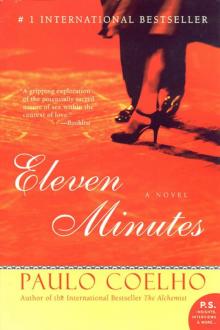 Eleven Minutes
Eleven Minutes Manuscript Found in Accra
Manuscript Found in Accra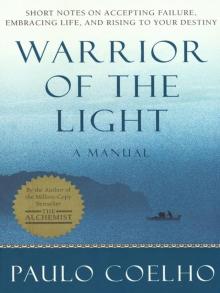 Warrior of the Light
Warrior of the Light Veronika Decides to Die: A Novel of Redemption
Veronika Decides to Die: A Novel of Redemption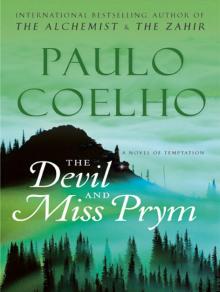 The Devil and Miss Prym: A Novel of Temptation
The Devil and Miss Prym: A Novel of Temptation The Valkyries: An Encounter With Angels
The Valkyries: An Encounter With Angels Brida: A Novel
Brida: A Novel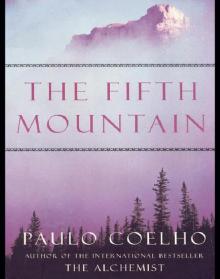 Fifth Mountain: A Novel
Fifth Mountain: A Novel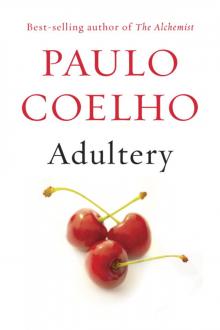 Adultery
Adultery Inspirations
Inspirations The Archer
The Archer The Witch of Portobello
The Witch of Portobello The Pilgrimage
The Pilgrimage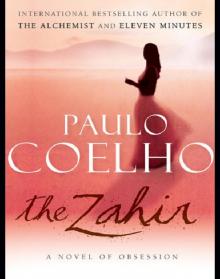 The Zahir
The Zahir Brida
Brida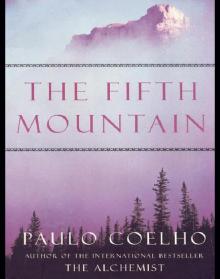 The Fifth Mountain
The Fifth Mountain Like the Flowing River: Thoughts and Reflections
Like the Flowing River: Thoughts and Reflections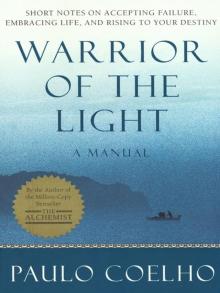 Manual of the Warrior of Light
Manual of the Warrior of Light By The River Piedra I Sat Down & Wept
By The River Piedra I Sat Down & Wept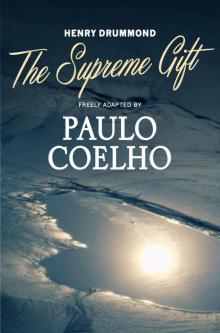 The Supreme Gift
The Supreme Gift Aleph
Aleph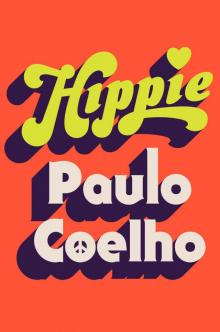 Hippie
Hippie Witch of Portobello
Witch of Portobello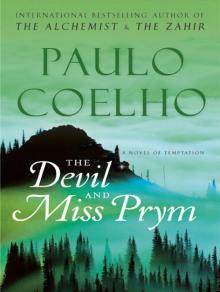 The Devil and Miss Prym
The Devil and Miss Prym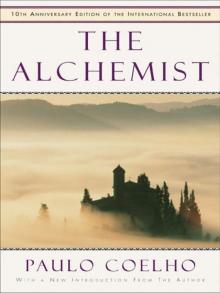 The Alchemist - 10th Anniversary Edition
The Alchemist - 10th Anniversary Edition The Valkyries
The Valkyries